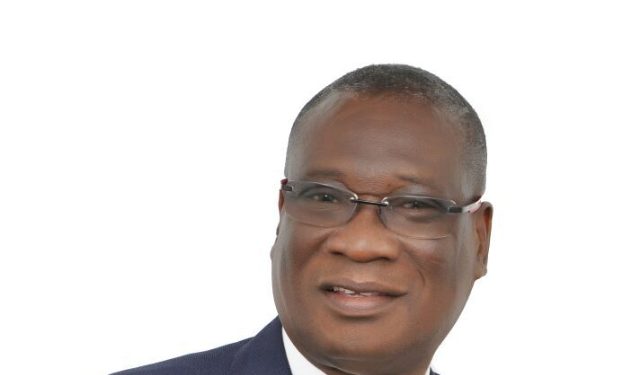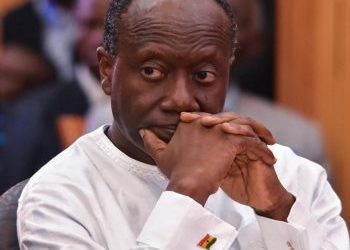Kofi Koduah Sarpong, one of the most wasteful public servants in the history of the country, is finally packing out from office as the Chief Executive Officer (CEO) of the Ghana National Petroleum Corporation (GNPC) from Friday.
But the interesting development is that, KK Sarpong is being replaced by a relative of the President by name Opoku Ahweneeh Danquah, an American returnee who was brought to Ghana through the instrumentality of the Executive Secretary to the President, Nana Bediatuo Asante.
Mr Danquah, is said to be a grandson of the late Joseph Boakye Danquah. Since he was brought back from the US, he had been the deputy chief executive officer in charge of technical operations at GNPC.
His history at the Tema Oil Refinery (TOR) during the Kufuor era, is nothing to write home about as he left massive debts.
He was appointed a caretaker CEO at the age of 63, although the GNPC law puts the compulsory retirement of a CEO at age 60.
He had wanted to stay on, but the Presidency is said to have had enough of him.
Ahead of his departure, The Herald is informed that, he tried making some sweeping changes and transfers, but was blocked by the Board led by Freddie Blay, the National Chairman of the New Patriotic Party (NPP).
The Herald, has picked up reports that as at last week, he had transferred one James Yamoah from the GNPC Headquarters formerly the Chief Operating Officer with the blessing of the Minister of Energy, Matthew Opoku Prempeh, without knowing where to send him.
Mr Yamoah, said to have once served as a General Manager for Health and Safety, is said to be one of the institutional memories of GNPC, but was sidelined by the KK Sarpong administration.
GNPC under him, has recorded significant loss to the tune of over GH1. 63 billion.
COCOBOD, where he once worked as Deputy Managing Director, the narrative has been that he was dragged to the Commission on Human Rights and Administrative Justice (CHRAJ) on certain developments that happened there.
Last year, The Herald reported about his purchase of a property at US$7.2 million dollar for the use of GNPC staff without any competitive tender process.
The building was purchased from Global Haulage, a company he had worked for prior to becoming CEO of GNPC.
A Public Interest and Accountability Committee (PIAC) report accused him of conflict of interest in the transaction.
The latest PIAC report, released just last week, also indicted his management and asked that they stop granting loans to the government and State institutions.
PIAC, had made the call on the back of evidence that the government and some of its agencies owe GNPC huge sums of money that are yet to be paid.
PIAC, in its 2021 annual report on the management of Ghana’s petroleum revenue, urged GNPC to hasten efforts to recover its loans from the government and state agencies to ensure that its planned programmes are not interrupted.
“PIAC calls on GNPC to double up efforts at recovering loans to government and its agencies to ensure that the Corporation’s work programme does not suffer from non-implementation. For now, GNPC should discontinue granting loans and guarantees until significant recoveries are made with respect to outstanding loans and guarantees owed the Corporation,” the report stated in its recommendations.
The report found that GNPC could not realise $126 million of $318 million owed by government and state agencies since 2011 in loans and guarantees.
“In its work programme for 2021, GNPC indicated that it was aiming to recover a minimum of US$126.68 million, out of an accumulated total of US$318.09 million, owed the Corporation by Government of Ghana and its Agencies. The Corporation indicated that this was necessary if the Corporation is to balance its 2021 Budget.”
“However, no amount was recovered at the end of 2021. In that regard, the Corporation put together a 3-year staggered repayment plan for outstanding receivables, some of which have been outstanding since 2011 and are seriously hampering the effective implementation of the Corporation’s mandate and work programmes,” the report stated.
Meanwhile, PIAC is reporting that Ghana saw a 17.5percent increase in its oil revenue in 2021, compared to the revenue in 2020.
From US$666.39 million to US$783.33, PIAC said the increase was due to the upsurge in the price of crude on the international market.
Ahweneeh Danquah’s appointment comes at a critical moment for Ghana’s oil and gas industry.
The sector has a dire need to maximise its use of the country’s little-exploited oil and gas reserves at the very moment when “the West” has begun calling for an energy transition to renewables.
Danquah has over 18 years of experience in strategy across multiple businesses, with most of his focus in, but not limited to, oil and gas.
He joined GNPC from Vallourec, where he managed the North American strategy, development and innovation team.
Before this, Ahweneeh Danquah held senior management positions at BHGE (Baker Hughes) and General Electric.
Prior to that, he was on the advisory board and also the global strategic marketing manager for Schlumberger’s upstream consulting arm SBC.
Interestingly, this was the consultancy that put in place GNPC’s current operational framework, post-Jubilee oil production. Danquah also held a director role at Hart Energy, where he helped to establish the firm’s consulting and research group.
His professional tenure also includes work for Wood Mackenzie, IHS CERA, Euromoney Institutional Investor and Bank of America.
He is the author of various industry publications, and holds a Bachelor’s degree in economics from Middlebury College in the United States, with a minor in French.
He also holds a Master’s degree from the Fletcher School of Tufts University, where his study focused on both international business and international relations. Danquah completed the strategy coursework for his Master’s degree at Harvard Business School.
He is an alumnus of Presbyterian Boys’ Secondary School (PRESEC, Legon), and represented the school in the National Science and Maths Quiz (NSMQ).










Discussion about this post